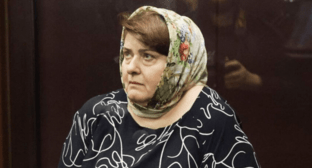10 November 2004, 18:42
An Appeal to the European Union Concerning Chechnya. EU-Russia Summit. November 11, 2004
The second phase of the armed conflict in the Chechen Republic, defined by the Russian Federation as a "counter-terrorist operation" has lasted five years. Civilians represent the primary victims of this conflict, and blatant violations of human rights and humanitarian law have been pervasive. The climate of impunity dominates the situation in and around Chechnya. Russian authorities persist in conducting a policy of force in the Republic and seem unwilling to change their approach despite the failure of their actions to bring stability to the region.
The war as such is today confined to the mountainous area in the South of the Republic. But also in the valley part in the North, civilians, including women and children, continue to suffer at the hands of the Russian military and Chechen enforcement structures. Extrajudicial killings, enforced disappearances, torture and looting are pervasive. These problems are not localized in Chechnya. They spread onto the territory of neighboring Ingushetia with alarming speed: the most vivid example to this is the 21/22 June 2004 large-scale attack of the rebel-fighters in Ingushetia, and the alarmingly number of unlawful arrests and enforced disappearances in Ingushetia over the past year.
The conflict in and around Chechnya has an increasingly negative impact on Russia as a whole. One of the bitterest fruits of the Chechen war is the growing arbitrariness and brutalization of law-enforcement. Policemen from all regions of the country are sent to serve in Chechnya on rotation for periods of six months. In Chechnya, they become immersed in the climate of violence and impunity and, upon their return, replicate arbitrary and often violent practices learned there in their home towns. The same is true for military servicemen.
Another disease for contemporary Russia to a large extent rooted in the Chechen war is the increasing intolerance with regard to Chechens and Caucasians in general.
A particularly disastrous phenomenon rooted in the Chechen war are suicide bomb attacks that appeared in Russia only a little over a year ago. Today, terrorist attacks by suicide bombers are becoming ever more frequent in large Russian cities.
All in all, the so-called anti-terrorist operation in Chechnya can be associated with a pronounced growth of terror. This has already found a reflection in the official documents of the Russian procuracy which, ironically enough, acknowledges that as a result of the anti-terrorist operation in the Northern Caucasus the threat of terrorist attacks across the country has significantly increased.
The latest, most cynical and cruel of terrorist attacks linked to that conflict was the heinous slaughter in Beslan, North Osetia, in September of this year, where over a 1000 of children, parents and teachers were taken hostage by a group of armed men and women and over 300 persons (171 of them – children) died and hundreds were wounded. Whilst unreservedly condemning the Beslan attack, we cannot but note that it took place against a backdrop of five years of widespread, persistent and largely unpunished human rights violations by Russian troops against civilians in Chechnya as well as egregious human rights abuses by rebel fighters and terrorists. The impunity for such abuses has served to perpetuate the conflict and has led to atrocities committed by both sides.
At the beginning of the second Chechen war, Russia was faced with a strong pressure from the Western democracies to find a political solution. This pressure receded after the tragic events of September 11, which were successfully used by the Russian Federation to present the war in Chechnya as an integral part of the international fight against terror. President Putin was among the first heads of state to express his commiseration to President Bush. Russia immediately became an active member and an important partner of the West in the anti-terrorist coalition.
Consequently, Western democracies became less vocal about the blatant violations of human rights and international humanitarian law perpetrated by the Russian forces in Chechnya. Already in March 2002, the UN Human Rights Commission failed to adopt a resolution on the situation in Russia/Chechnya (even though such resolutions had been adopted in the two previous years). At the close of 2002, the OSCE mission in Znamenskoe was shut down. In spring 2003, the Council of Europe experts suspended their activities in Chechnya (the actual suspension was explained by security reasons as there was an attack on the experts convoy but their work has not been resumed to this day). Thus, international presence in the region has become virtually non-existent and international pressure on the Russian Government has abated.
What is more, today we cannot but admit that independent Western media fail to provide regular and adequate coverage of the situation in Chechnya that could influence the public at large and political forces. Once in a while, major Western periodicals publish stories relevant to human rights in Chechnya. But such publications are sporadic. Western media tend to fall under the influence of the official rhetoric of Russian politicians who assert that Chechnya has gained a firm footing on the path to normalization, and that peaceful life and stability have practically returned to the republic.
The ineffectiveness of Western media in connection with contemporary developments in Chechnya is to a large extent explained by the fact that the Russian Government has established an informational blockade there. Journalists encounter insurmountable obstacles in their work on Chechnya: refusals in visa issuance are becoming quite frequent, foreign correspondents are forbidden to work in the region independently, and their trips to Chechnya on official press-tours give them no objective perception of the situation as the programme of such press-tours naturally serves for the purposes of pro-Kremlin propaganda. Thus, the international community remains cut off from independent, unbiased information on Chechnya and cannot grasp the actual dangers that the on-going conflict presents both for Russia and for the entire Europe.
Within Russia the public also does not receive adequate coverage of the situation in Chechnya and stands unaware of the disturbing scope of the crisis as freedom of information is severely infringed upon. Federal TV is entirely dependent on the State and only serves as a mouth-piece of official propaganda. Independent print media still exist but those periodicals are quite marginal and cannot reach broad audiences.
We are deeply concerned that Chechnya itself is becoming a forgotten conflict zone. But the bloodshed continues and cruelty and violence reach truly unprecedented levels both in Chechnya and beyond.
The IHF calls upon the European Union States to insist that the Russian government adheres to its obligations under international human rights and humanitarian law. In particular, we note the resolution passed by the Parliamentary Assembly of the Council of Europe in October 2004:
"14. The Assembly therefore, reiterating its exhortations in paragraphs 9 and 10 of Resolution 1323 (2003),
i. urges the Government of the Russian Federation to take additional measures to eliminate the climate of impunity in the Chechen Republic,
a. by vigorously investigating and prosecuting all violations of human rights, without regard to the identity of the perpetrators;
b. by implementing the recommendations of the Council of Europe Commissioner for Human Rights;
c. by sending a clear signal from the highest political level that all security and law enforcement officials must respect human rights in the execution of their duties at all times;
d. by providing reparation, including compensation, to victims of human rights abuses;
e. by enabling systematic monitoring by national and international human rights organisations of human rights violations as well as of the measures taken by the competent authorities to track down and punish perpetrators;
f. by fully co-operating with all Council of Europe mechanisms, in particular with the Committee for the Prevention of Torture;
g. by taking effective measures in order to prevent any reprisals to any person in relation to the filing of an application to the European Court of Human Rights, ensuring that all allegations of such crimes are investigated promptly, thoroughly and independently and that all persons found responsible for such crimes are brought to justice;
h. and by facilitating access to the region by the national and international news media;
ii. urges the Government of the Russian Federation to ensure that anti-terrorism measures taken or planned are in conformity with standards of human rights and humanitarian law, including the European Convention on Human Rights, the Geneva Conventions and the Council of Europe Guidelines on Human Rights and the Fight against Terrorism;"
Moreover, we recall the resolution adopted by the United Nations Human Rights Commission in April 2001, which called upon the Russian government to:
"[...] establish, according to recognized international standards, a national broad-based and independent commission of inquiry to investigate promptly alleged violations of human rights and breaches of international humanitarian law committed in the Republic of Chechnya of the Russian Federation in order to establish the truth and identify those responsible, with a view to bringing them to justice and preventing impunity."
Moreover, referring to our recent report "The Silencing of Human Rights Defenders in Chechnya and Ingushetia", we recommend to the governments of the EU member states to consider means of protecting persecuted local defenders, including special measures of temporary resettlement in emergency cases, as per the newly issued EU Guidelines on Human Rights Defenders; and to assist human rights defenders by collecting information (including asylum interviews) pertaining to violations of human rights and humanitarian law (including attacks on human rights defenders) in Chechnya and Ingushetia.
We urge the European Union States to raise these resolutions and the progress in their implementation in their bilateral and multilateral negotiations with the Russian Federation. We also stress, in particular, that the European Union should clearly indicate that the key prerequisites for eliminating the climate of impunity through a transparent accountability process are increasing the presence of international organizations, such as the OSCE and the Council of Europe, and enabling journalists and human rights defenders to work in the region freely. In light of the expansion of the conflict zone and growing inter-ethnic and inter-religious tension between and within the republics of the Northern Caucasus, the European Union should assist the Russian Federation in elaborating and implementing effective peace-making programmes, particularly in Chechnya, Ingushetia, North Ossetia and Dagestan.
For further information:
International Helsinki Federation for Human Rights, Aaron Rhodes, Executive Director, +43-1-408 88 22
Moscow Helsinki Group, Tanya Lokshina, Programs Director, +7-095-207 0769
Human Rights Without Frontiers, Belgium, Willy Fautre, Chair, +32-2-34 56 145
Czech Helsinki Committee, Jana Chrzova, Executive Director, +420-2-257 323 508
Danish Helsinki Committee, Ole Esperson, Chair, +45-33-91 81 18
Finnish Helsinki Committee, Nina Suomelainen, Chair, +358-9-4155 2555
French Helsinki Committee, Dominique Tricaud, Secretary General, +33-1-40 64 00 25
German Helsinki Committee for Human Rights, Security and Cooperation in Europe,
Ulrich Fischer, Vice Chair, +49-170 807 2413
Greek Helsinki Monitor, Panayotis Dimitras, Speaker, +30-210-347 2259
Hungarian Helsinki Committee, Ferenc Kцszeg, Chair, +36-1-321 4141
Italian Helsinki Committee, Antonio Stango, Chair, +39-335-71 06 779
Latvian Center for Human Rights and Ethnic Studies, Ilze Brands-Kehris, Director, +371-70 39 290
Lithuanian Human Rights Association, Maria Staciokene, President, +370-698-123 20
Netherlands Helsinki Committee, Jos Kцsters, Director, +31-70-392 6700
Helsinki Foundation for Human Rights Poland, Andzej Rzeplinski, Secretary of Board, +48-22-828 1008
Slovak Helsinki Committee, Ingrid Baumannova, Executive Director, +421-2-5296 8875
Helsinki Monitor of Slovenia, Neva Miklavcic Predan, Chair, +386-1-425 8661
Swedish Helsinki Committee, Gerald Nagler, Chair, +46-8-791 8445
British Helsinki Subcommittee of the Parliamentarian Human Rights Group,
Lord Avebury, Chair, +44-207 274 4617
Bulgarian Helsinki Committee, Krassimir Kanev, Chair, +359-2-944 0670
Croatian Helsinki Committee for Human Rights, Zarko Puhovski, President, +385-1-481 23 22
Romanian Helsinki Committee, Monica Macovei, Chair, +402-1-312 45 28
Vienna, 2 November 2004
Source: International Helsinki Federation




